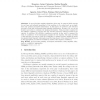Free Online Productivity Tools
i2Speak
i2Symbol
i2OCR
iTex2Img
iWeb2Print
iWeb2Shot
i2Type
iPdf2Split
iPdf2Merge
i2Bopomofo
i2Arabic
i2Style
i2Image
i2PDF
iLatex2Rtf
Sci2ools
113
click to vote
JUCS
2010
2010
A Selection Process Based on Additive Consistency to Deal with Incomplete Fuzzy Linguistic Information
: In group decision making situations, there may be cases in which experts do not have an in-depth knowledge of the problem to be solved and, as a result, they may present incomplete information. In this paper, we present a new selection process to deal with incomplete fuzzy linguistic information. As part of it, we use an iterative procedure to estimate the missing information. This procedure is guided by the additive consistency property and only uses the preference values provided by the experts. In addition, the additive consistency property is also used to measure the level of consistency of the information provided by the experts. The main novelties of this selection process are both the possibility to manage decision situations under incomplete fuzzy linguistic information and the importance of the experts’ preferences in the aggregation processes is modeled by means of the experts’ consistency. Key Words: group decision making, incomplete information, fuzzy linguistic infor...
| Added | 29 Jan 2011 |
| Updated | 29 Jan 2011 |
| Type | Journal |
| Year | 2010 |
| Where | JUCS |
| Authors | Francisco Javier Cabrerizo, Ruben Heradio, Ignacio Javier Pérez, Enrique Herrera-Viedma |
Comments (0)

